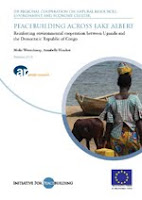“
Political Marginalization, Climate Change, and Conflict in African Sahel States,” authored by
Clionadh Raleigh and appearing in the March 2010 issue of
International Studies Review, examines the relationship between political status, economic status, and conflict among African communities threatened by climate change. “[T]he risk of conflict depends largely on the size and political importance of ethnic groups,” Raleigh finds. “Small, politically insignificant ethnic groups experience most conflicts related to environmental pressures.” The work is geared toward helping practitioners predict where high levels of vulnerability and conflict may occur in the face of climate change.
(SUBSCRIPTION ONLY)
 The Initiative for Peacebuilding and Adelphi Research‘s Peacebuilding Across Lake Albert: Reinforcing Environmental Cooperation Between Uganda and the Democratic Republic of Congo uses the case study of Lake Albert to explore the possibilities for, and limits of, peacebuilding initiatives around natural resources and the environment. Looking specifically at protected areas, water and fisheries, and energy and oil, the study finds that resources can serve as “entry points for improving trust-building between and within countries,” even amidst heightened competition. Peacebuilding Across Lake Albert concludes that local stakeholder participation is integral to success and recommends that donor efforts focus on strengthening communal ties, creating opportunities for “benefits-sharing from sustainable resource management,” and increasing inclusiveness throughout the development process.
The Initiative for Peacebuilding and Adelphi Research‘s Peacebuilding Across Lake Albert: Reinforcing Environmental Cooperation Between Uganda and the Democratic Republic of Congo uses the case study of Lake Albert to explore the possibilities for, and limits of, peacebuilding initiatives around natural resources and the environment. Looking specifically at protected areas, water and fisheries, and energy and oil, the study finds that resources can serve as “entry points for improving trust-building between and within countries,” even amidst heightened competition. Peacebuilding Across Lake Albert concludes that local stakeholder participation is integral to success and recommends that donor efforts focus on strengthening communal ties, creating opportunities for “benefits-sharing from sustainable resource management,” and increasing inclusiveness throughout the development process.
 The Initiative for Peacebuilding and Adelphi Research‘s Peacebuilding Across Lake Albert: Reinforcing Environmental Cooperation Between Uganda and the Democratic Republic of Congo uses the case study of Lake Albert to explore the possibilities for, and limits of, peacebuilding initiatives around natural resources and the environment. Looking specifically at protected areas, water and fisheries, and energy and oil, the study finds that resources can serve as “entry points for improving trust-building between and within countries,” even amidst heightened competition. Peacebuilding Across Lake Albert concludes that local stakeholder participation is integral to success and recommends that donor efforts focus on strengthening communal ties, creating opportunities for “benefits-sharing from sustainable resource management,” and increasing inclusiveness throughout the development process.
The Initiative for Peacebuilding and Adelphi Research‘s Peacebuilding Across Lake Albert: Reinforcing Environmental Cooperation Between Uganda and the Democratic Republic of Congo uses the case study of Lake Albert to explore the possibilities for, and limits of, peacebuilding initiatives around natural resources and the environment. Looking specifically at protected areas, water and fisheries, and energy and oil, the study finds that resources can serve as “entry points for improving trust-building between and within countries,” even amidst heightened competition. Peacebuilding Across Lake Albert concludes that local stakeholder participation is integral to success and recommends that donor efforts focus on strengthening communal ties, creating opportunities for “benefits-sharing from sustainable resource management,” and increasing inclusiveness throughout the development process. A Publication of the Stimson Center.
A Publication of the Stimson Center.








